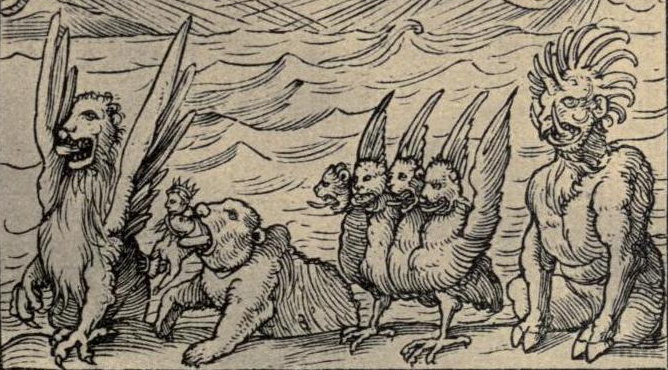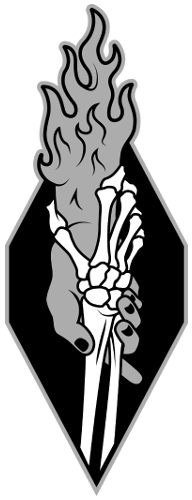I wrote this dragon essay as a speech, hoping to present it at an annual conference of “Left Hand Path” practitioners held locally this year, but the organizers did not respond to my inquiries. I suppose the collectivist nature of our message might have put them off, since some of the main participants have asserted that the Left Hand Path exclusively means individualism and the deification of the self. Even if we took that as an unassailable definition, the fact remains that most people need the support of family, peers, or perhaps an entire community in order to thrive, whether they realize it or not. Even Satanists crave love and respect. -N.K.
~~~~~
The Dragon: Individualism is Not Enough.
Historically, practitioners on the Left Hand Path have promoted a core tenet of individual power: the self as a god, me against the world, übermensch versus sheeple, and generally the acquisition of secret knowledge and powers for one’s own benefit.
European folktales and occult imagery commonly use a dragon to represent this motif, and it is no accident that many on this path identify with the dragon. The stories describe it as immensely powerful, ancient, beautiful, mysterious, independent, amoral, and almost invincible. It isolates itself inside the depths of a mountain, only venturing out to eat and plunder.
But this raises a mountain of questions. Why does the dragon hoard treasure, what good does that do? Certainly the dragon must take some pleasure in it, but we know that retail therapy only makes us feel better for a brief moment — then we slide down to the same level of emptiness and need that we felt before. As Americans we typically respond to that crash by just acquiring new things all the time, trying to fill the gap and chase that endorphin rush; but what if isolated hoarding -whether of objects or of esoteric knowledge- was not actually an effective means for dealing with those feelings?
Is the dragon happy or satisfied with its life? Most of the time stories depict dragons as either sleeping or burning up people and villages. Maybe we don’t really want to spend our entire lives either asleep or in pointless conflict. Notice too that the dragon has a vast hoard of gold and jewels, but he still steals his meat from poor farmers. The villagers bring him their virgin daughters as offerings, to assuage his wrath, but it never works.
Is the dragon wise? Their venerable age and inscrutability makes us think so, but maybe their lizard brain does not have the capacity for anything beyond hoarding and eating. And even if they were in fact deeply intelligent and steeped in wisdom, they are not generally known for using their wisdom in any way, nor helping anyone else learn anything useful apart from “don’t wake the dragon.”
For people who don’t see themselves as the dragon, the “hero” is the young man who breaks into the mountain lair and kills the dragon. The king then rewards him for it with wealth, a property wife, and a prestigious title. We raise our children to believe the dragon’s only purpose is to be killed–in order for its killer to be granted the privilege of having power over other people. The stories may start off with the altruistic wish to stop a scary monster from harming the villagers, but it always ends in a metaphor for individualism, converted by the sword into a literal description of the worst aspects of patriarchal capitalism.
So–if the dedicated individualist, the dragon, doesn’t have any other point to his life beside defending his own preferential status; and if he’s traditionally doomed to death at the hands of a teenager fecklessly doing the dirty work for a feudal regime; then perhaps the folk stories of dragons contain a deeper message: that individualism is not enough.
In Biblical terms, theological artists painted the dragon to represent the empire of Rome. When stories from those books describe angels battling and defeating the dragon, they propose a fantasy that some higher powers will magically come down and save the citizenry from a cruelly unjust government. Most of us here can agree that no outside angels will ever save us; instead we must develop those higher powers ourselves, and fight the oppressive modern empire of apocalypse-fetish theocracy.

Dragon Family and Community
We notice that the dragon has no defenders. Nobody is sorry when he dies. What if the dragon had utilized its vast wealth and power to the benefit of the villagers? For one thing, they would willingly bring him sheep, he wouldn’t need to steal them; nobody would think to sacrifice their daughters to him; and the villagers would not need to ask some pimply-faced boy to clamber up the mountainside and stick a sword in him.
If the dragon had a support network to back him up, the story might end in a different way. But firstly we’re talking about a symbol of preciously defended individualism, and secondly neither arms races nor gang rumbles have ever worked out that well as a way of life. There’s always another force out there ready to humble anyone who thinks their group is so tough. Plus, if your gang is made up of ideological individualists, honestly you can’t trust them to stay by your side when things get rough—they will look out for themselves.
In order for a group of loner types to work as a community, either they must help each other on the expectation of reciprocity, or they must not actually be limited by the simplistic pigeonhole of a fairy-tale metaphor.
In either case, let us reflect on the theme of tonight’s festivities, “darkness indivisible”. We come here from a variety of paths, but with common interests, and I will take a wild stab that most of us think of ourselves as iconoclasts, outsiders, monks and witches studying secrets and living in ways that general society definitely shuns, if not outright forbids. We came here to share with each other and learn from each other. You might go a step further and buy each other’s books and t-shirts, or even sign up for Patreon or other digital subscription programs. This reciprocity is a great start, I welcome it gladly.
But what of the second option, the possibility that we don’t have to be stuck in the narrow bounds of an ideology of individualism? What if our belief in personal empowerment, shared by presumably everyone here today, could extend to a general belief in empowering all those around us?

When you lift up someone else, it does not make you lesser than them. Most of the time, it doesn’t even cost anything. People like to complain about pronouns, for example, but it costs us literally nothing to show the courtesy of using the right pronoun. Same goes for marriage, employment, and public bathrooms—it takes nothing away from one person to let another person live their best life. In fact, we can save ourselves from ongoing headaches and conflict that way, meaning it actually serves our individual best interest.
Sure, there will always be people out there whose only motivation is to take and destroy, whether from greed, narcissism, nihilism, or accelerationism. It makes sense to remove your support from such nasty pieces of work, to protect yourself and others from harm. We can love reptiles in general without clasping a venomous viper to our breast.
Similarly, you can feel kinship with the viper, alert to any incursion and ready to strike, without binding yourself in to only feeling that way. If our entire range of relations with the outside world consists only of twitchy irritation and violent reaction, with no principle beyond “don’t tread on me”, then that blocks you from experiencing a vast spectrum of lived experiences and other truths. Those blinders also prevent us from accessing many inner mysteries only seen by people who make themselves vulnerable and receptive.
None of that means you have to deny the aspects of yourself that resonate with the archetypes of the dragon, the viper, or any other fiercely independent creature. But we must not constrain ourselves so arbitrarily, to our own detriment. Just as the study and adoption of magical attributes expands our perceptions and abilities beyond the basic minimum of human existence, so too we can become so much more, so much richer in wisdom and power, if we allow ourselves to reach outside the narrow corridor of isolation that so many of us find familiar and comfortable.
Yes, society at large vastly under-appreciates the Left Hand Path. Yes we must revitalize and champion the strengths and mysteries of this path. But let us not fall into the easy trap of thinking that this one way holds all the secrets, or that we can thrive -individually or as fellow travelers- by denying ourselves the flexible strength and resilience gained by working together and supporting each other. By rejecting or belittling other vulnerable outsiders, we deny so much to ourselves. We have the potential to become so much more powerful by lending them our strength, respect, and shelter, bringing people to join us in our great Work.
Only in this way can we achieve the full potency and mighty conflagration of Darkness Indivisible.
